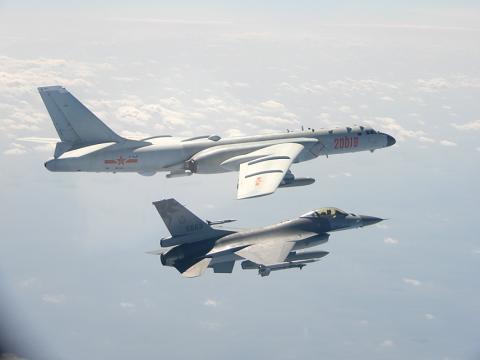The air force on Monday scrambled to warn off approaching Chinese jets, the first time they were spotted near Taiwan’s air space at night, the Ministry of National Defense said.
Taiwan has repeatedly said that China has stepped up its drills near the nation when it should be focusing its efforts on combating the spread of COVID-19.
An unspecified number of Chinese J-11 fighters and KJ-500 airborne early warning and control aircraft flew into the waters southwest of Taiwan for nighttime exercises, the ministry said late on Monday.

Photo: EPA-EFE
They came close to Taiwan’s air defense identification zone at about 7pm, ministry spokesman Major General Shih Shun-wen (史順文) said.
“After our air reconnaissance and patrol aircraft responded appropriately, and broadcast [an order] to drive them away, the [Chinese] communist aircraft flew away from our air defense identification zone,” he said.
The maneuvers were part of the Chinese squadron’s nighttime training mission, the ministry said.
The military keeps close watch on the Taiwan Strait and its environs to ensure the nation’s security, and people have no cause for alarm, it said.
The last time that the Chinese military conducted a similar mission near Taiwan’s airspace was on Feb. 28, when an unspecified number of Chinese H-6 bombers flew over the waters southwest of Taiwan, according to ministry records.
There was no immediate comment from China’s military on the latest drills.
China has been flying what it calls “island encirclement” drills on and off since 2016 when President Tsai Ing-wen (蔡英文) first took office.
The COVID-19 pandemic has worsened already poor relations between Taiwan and China, with the two sides accusing each other of spreading fake news, and Taiwan particularly angered by Beijing blocking its access to the WHO.

A magnitude 7.0 earthquake struck off Yilan at 11:05pm yesterday, the Central Weather Administration (CWA) said. The epicenter was located at sea, about 32.3km east of Yilan County Hall, at a depth of 72.8km, CWA data showed There were no immediate reports of damage. The intensity of the quake, which gauges the actual effect of a seismic event, measured 4 in Yilan County area on Taiwan’s seven-tier intensity scale, the data showed. It measured 4 in other parts of eastern, northern and central Taiwan as well as Tainan, and 3 in Kaohsiung and Pingtung County, and 2 in Lienchiang and Penghu counties and 1

FOREIGN INTERFERENCE: Beijing would likely intensify public opinion warfare in next year’s local elections to prevent Lai from getting re-elected, the ‘Yomiuri Shimbun’ said Internal documents from a Chinese artificial intelligence (AI) company indicated that China has been using the technology to intervene in foreign elections, including propaganda targeting Taiwan’s local elections next year and presidential elections in 2028, a Japanese newspaper reported yesterday. The Institute of National Security of Vanderbilt University obtained nearly 400 pages of documents from GoLaxy, a company with ties to the Chinese government, and found evidence that it had apparently deployed sophisticated, AI-driven propaganda campaigns in Hong Kong and Taiwan to shape public opinion, the Yomiuri Shimbun reported. GoLaxy provides insights, situation analysis and public opinion-shaping technology by conducting network surveillance

‘POLITICAL GAME’: DPP lawmakers said the motion would not meet the legislative threshold needed, and accused the KMT and the TPP of trivializing the Constitution The Legislative Yuan yesterday approved a motion to initiate impeachment proceedings against President William Lai (賴清德), saying he had undermined Taiwan’s constitutional order and democracy. The motion was approved 61-50 by lawmakers from the main opposition Chinese Nationalist Party (KMT) and the smaller Taiwan People’s Party (TPP), who together hold a legislative majority. Under the motion, a roll call vote for impeachment would be held on May 19 next year, after various hearings are held and Lai is given the chance to defend himself. The move came after Lai on Monday last week did not promulgate an amendment passed by the legislature that

AFTERMATH: The Taipei City Government said it received 39 minor incident reports including gas leaks, water leaks and outages, and a damaged traffic signal A magnitude 7.0 earthquake struck off Taiwan’s northeastern coast late on Saturday, producing only two major aftershocks as of yesterday noon, the Central Weather Administration (CWA) said. The limited aftershocks contrast with last year’s major earthquake in Hualien County, as Saturday’s earthquake occurred at a greater depth in a subduction zone. Saturday’s earthquake struck at 11:05pm, with its hypocenter about 32.3km east of Yilan County Hall, at a depth of 72.8km. Shaking was felt in 17 administrative regions north of Tainan and in eastern Taiwan, reaching intensity level 4 on Taiwan’s seven-tier seismic scale, the CWA said. In Hualien, the